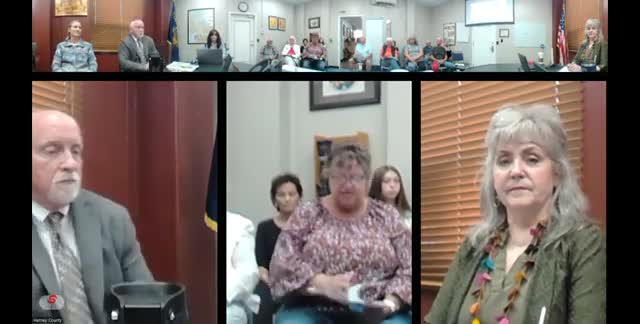County Council Faces Housing Crisis Amid RV Ordinance Debate
August 07, 2024 | Harney County, Oregon
This article was created by AI summarizing key points discussed. AI makes mistakes, so for full details and context, please refer to the video of the full meeting. Please report any errors so we can fix them. Report an error »

During a recent government meeting, key discussions centered around environmental initiatives, agricultural support, and local housing regulations in Harney County.
The watershed council reported ongoing efforts to enhance agricultural infrastructure, including the establishment of new aggregate stations and the implementation of weather stations known as Agramet, which are designed to assist farmers and ranchers in monitoring weather conditions. Currently, there are two operational Agramet stations, with plans for two additional stations in the near future.
A contentious topic was the basin groundwater rules, which have been temporarily stalled due to summer wildfires. A virtual meeting is scheduled for August 13 to address these ongoing issues. The council also highlighted its participation in the Harney Basin Wetlands Collaborative, which recently secured a significant grant aimed at improving agricultural infrastructure over the next six years.
In addition to these environmental projects, the council is exploring innovative methods to promote water storage through a remote sensing project focused on beaver habitats. This initiative aims to enhance water retention in upland areas, potentially leading to extended water flows during the summer months.
The meeting also touched on the success of the college range camp, which saw a record 63 participants this year, providing students from various states with hands-on experience in natural resource management.
On the housing front, public comments raised concerns regarding a 24-year-old ordinance regulating the presence of RVs on private property. Local business owner Cheryl Smith expressed frustration over the enforcement of this ordinance, particularly in light of the current housing crisis. The county court acknowledged the need to revisit the ordinance and suggested organizing a work session to gather public input and explore potential modifications.
The court emphasized the importance of community involvement in these discussions, encouraging residents affected by the RV regulations to participate in the upcoming work session to share their experiences and suggestions. This collaborative approach aims to address the evolving housing needs of the community while balancing regulatory concerns.
The watershed council reported ongoing efforts to enhance agricultural infrastructure, including the establishment of new aggregate stations and the implementation of weather stations known as Agramet, which are designed to assist farmers and ranchers in monitoring weather conditions. Currently, there are two operational Agramet stations, with plans for two additional stations in the near future.
A contentious topic was the basin groundwater rules, which have been temporarily stalled due to summer wildfires. A virtual meeting is scheduled for August 13 to address these ongoing issues. The council also highlighted its participation in the Harney Basin Wetlands Collaborative, which recently secured a significant grant aimed at improving agricultural infrastructure over the next six years.
In addition to these environmental projects, the council is exploring innovative methods to promote water storage through a remote sensing project focused on beaver habitats. This initiative aims to enhance water retention in upland areas, potentially leading to extended water flows during the summer months.
The meeting also touched on the success of the college range camp, which saw a record 63 participants this year, providing students from various states with hands-on experience in natural resource management.
On the housing front, public comments raised concerns regarding a 24-year-old ordinance regulating the presence of RVs on private property. Local business owner Cheryl Smith expressed frustration over the enforcement of this ordinance, particularly in light of the current housing crisis. The county court acknowledged the need to revisit the ordinance and suggested organizing a work session to gather public input and explore potential modifications.
The court emphasized the importance of community involvement in these discussions, encouraging residents affected by the RV regulations to participate in the upcoming work session to share their experiences and suggestions. This collaborative approach aims to address the evolving housing needs of the community while balancing regulatory concerns.
View the Full Meeting & All Its Details
This article offers just a summary. Unlock complete video, transcripts, and insights as a Founder Member.
✓
Watch full, unedited meeting videos
✓
Search every word spoken in unlimited transcripts
✓
AI summaries & real-time alerts (all government levels)
✓
Permanent access to expanding government content
30-day money-back guarantee

